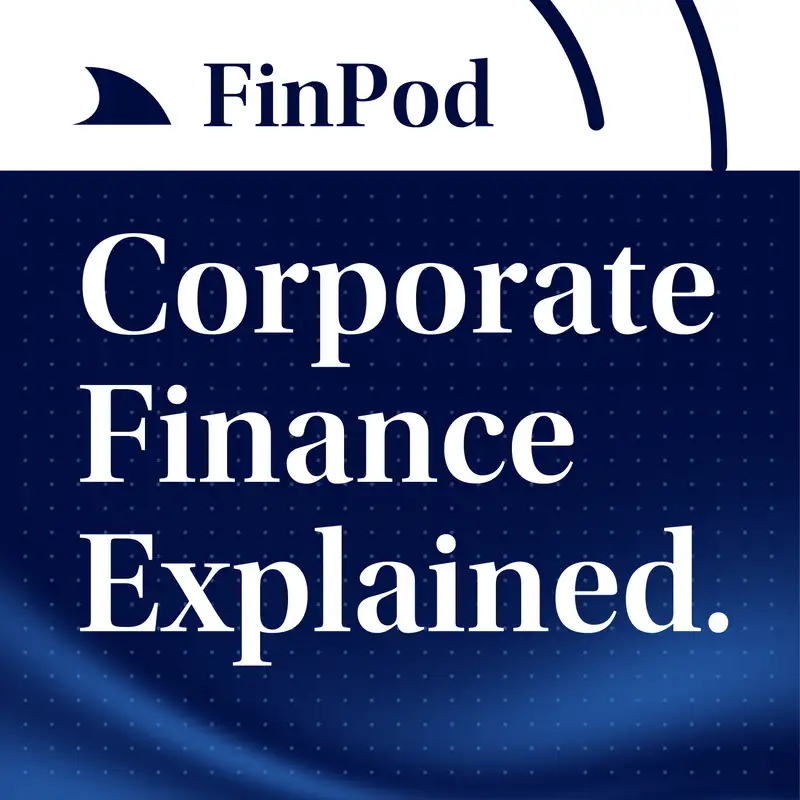Corporate Finance Explained | The Role of Credit Ratings: Impact, Strategy, and Real World Lessons
[00:00:00:00 - 00:03:20:21]
Ever wondered how these, you know, giant corporations like Apple or Ford actually managed to fund everything? I mean, building new factories, launching products, it can't just be about selling phones or cars, right? There's got to be something else going on behind the scenes. Oh, absolutely. There's a huge factor often kind of invisible, corporate credit ratings. OK. These are basically report cards. They grade a company's financial health, specifically its ability to pay back debt. And they're issued by big agencies you've probably heard of, like S&P Global Ratings and Moody's. S&P and Moody's, right. So today we're doing a deep dive into exactly that. We want to unpack what these ratings actually mean, why there's such a big deal, and how they directly shape a company's strategy. And it's financial wiggle room, I guess. Exactly. And we've got some really interesting real world examples companies all across the board. Some top tier, some that ran into trouble, even a comeback story. Sounds great. So to really get a grip on this, maybe you start us off with the basics. What's landscape look like? OK, so think of it like a spectrum. On one end, you've got the really desirable investment grade ratings that signals, you know, strong financial footing. OK. On the other end, there's the riskier speculative grade. You often hear it called maybe less flatteringly junk status. Junk status, right. Heard that one. Yeah. And it's pretty simple. The higher the rating, the more stable the company looks to investors, more trustworthy, essentially. So this gold standard, the top tier, what does that actually look like for a company? Can you give us an example? Definitely. Apple Inc. is probably one of the best examples globally. They have incredibly high ratings. A 1 from Moody's, A plus from S&P. Top of the class. Wow. OK, A plus and A 1. And what does that do for them? Well, what it lets them do is issue bonds, basically borrow money at really, really low interest rates. Their borrowing cost is minimal. So it's cheap money, basically. Extremely cheap money. And what's fascinating is they can do this even when they don't like urgently need the cash for operations. So it's strategic. Totally. They can use these funds for things like huge share buybacks, which, you know, signals confidence to the market, boost shareholder value. It's a massive advantage. It's like a financial superpower, isn't it? Maintaining that market dominance. It really is. And it's not just tech giants. Look at Toyota Motor Corporation, another global player, consistently high investment grade ratings, A1, A plus, Deaf. Right. Toyota. And why them? Well, they're known for being financially conservative. They keep strong cash reserves and their revenue is spread out globally. So they're not too reliant on one market. Diversified. Makes sense. And because of that stability, they can borrow affordably in all sorts of different currencies. It really shows how global these ratings are, how much influence they have. OK, so that's the sunny side. Yeah. But things don't always go smoothly, do they? What happens when a company stumbles? Even a big one. No, definitely not. And Ford Motor Company is a stark example here. Back in March 2020, S&P hit them with a big downgrade. Oh, right. I remember that. What happened? They dropped Ford into junk status. The reasons were pretty clear, unfortunately. Auto sales were down, debt was piling up and then they were having some operational challenges. And the impact of going to junk. What did that mean practically?
[00:03:21:23 - 00:04:04:22]
Well, it was pretty punishing. First off, their borrowing costs shot way up. Suddenly, it's much more expensive for Ford to raise money. OK, that makes sense. More risk, higher interest. Exactly. But maybe even more crucially, that junk rating actually barred a lot of big institutional investors, think pension funds, insurance companies from holding Ford's bonds. Many have rules saying they can only hold investment grade debt. Wow. So it literally shrinks the pool of people willing to lend the money. Precisely. It directly hit their access to capital. And that forces some really tough decisions about, you know, long term projects, R&D, expansion plans. It can rewrite a company's future pretty fast. That sounds incredibly difficult. Does falling to junk mean it's like game over?
[00:04:05:22 - 00:07:53:23]
Or can companies fight back from that? It's definitely a tough spot, a really precarious position, but not necessarily a death sentence. Look at General Electric, GE. They had a rough patch around 2018. GE, right. What happened there? Similar story in some ways. Years of rising debt. Some divisions weren't performing well and Moody's and S&P both downgraded them, pushing their rating down to just above junk status. So they were right on the edge. Theutering. Yeah. But what's interesting is how GE reacted. They didn't just sit there. They went into overdrive, aggressive debt reduction, selling off major assets, really refocusing on their core industrial businesses. So a major restructuring. A major, very public restructuring. Everything they did was aimed at getting investors back on side, shoring up their finances. It was a clear fight to regain trust and frankly to survive in their current form. That really shows the pressure these ratings put on companies. OK, so we've seen the top tier, the fall, the fight back. Yeah. What about a full turnaround? A comeback story. Ah, yes. Netflix is a great example of that. For a long time, Netflix was actually rated speculative grade jump status. Really? Netflix. Why was that? Mostly because they were spending so much money on content. Remember when they were just pouring billions into original. Yeah. Building the empire. Exactly. That meant they often had negative free cash flow. They were burning through more cash than they were bringing in from subscriptions, basically. Investors saw that as risky. OK, so heavy spending, negative cash flow, risky profile. But they turned it around. They did impressively. By 2022, they managed to get upgraded to investment grade. What change? A couple of things. Their subscriber growth stabilized and became more predictable. And crucially, they made a real shift towards profitability. They weren't just focused on growth at all costs anymore. Right. Focusing on the bottom line, too. Yep. And the impact of that upgrade was immediate. Lower interest costs on their debt. Suddenly, a much wider pool of investors willing to buy their bonds. It's a perfect example of how improving your actual business fundamentals translates directly into financial advantages. That's fascinating. So bringing this all together, these credit ratings, they sound kind of technical, maybe a bit abstract. Like something only finance nerds care about. But what you're saying is they have real world consequences for everyone. Absolutely. They directly impact a company's ability to do almost anything big, innovate, build new factories, hire people, expand. It all costs money. And the rating affects the cost of that money. Precisely. It affects the cost of everything from R&D funding to constructing a new plant. It's like financial gravity, maybe. Financial gravity? I like that. The stronger you're rating, the less effort it takes to, well, get things off the ground. Yeah, something like that. They're a powerful, often hidden lever in the economy. They really do shape which companies get the resources to thrive and which ones face serious financial headwinds. Trying to fund a massive expansion without a good credit rating. It's a whole different, much harder game. So we've seen today how these ratings from agencies like SAP and Moody's aren't just letters on a page. They're a critical report card. They dictate borrowing costs, access to capital. We saw it with Apple smoothly funding whatever they want, Ford facing higher costs and investor restrictions, and then Netflix climbing back up. It's clear they tell a real story. A really profound story about a company's health, its past decisions and its future options. Right. Which kind of makes you wonder, doesn't it? What other financial details, things that seem arcane or hidden, are quietly shaping the world? That's a great question. What hidden stories are lurking in the balance sheets or market data of the companies you interact with every day? Something to think about. Definitely something to think about. Keep exploring.

